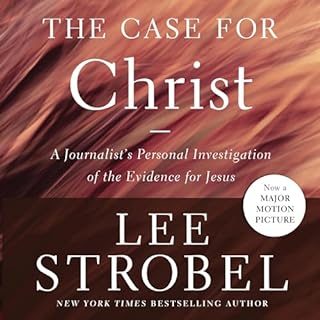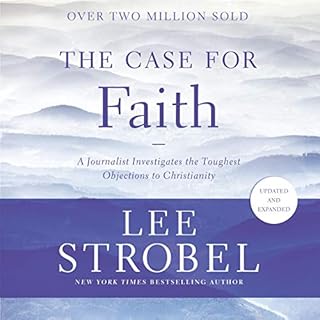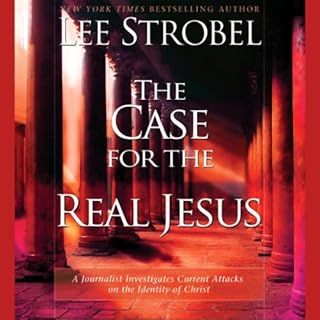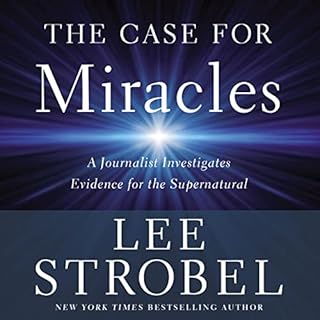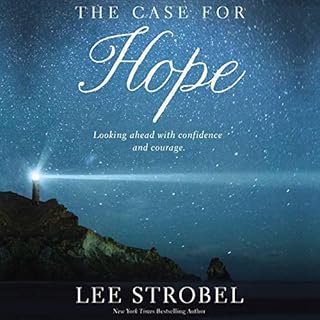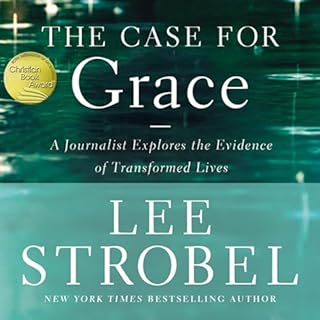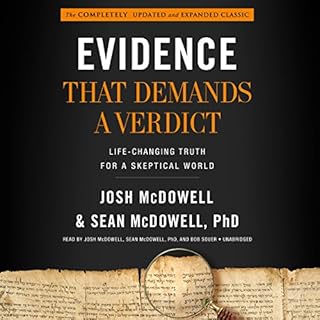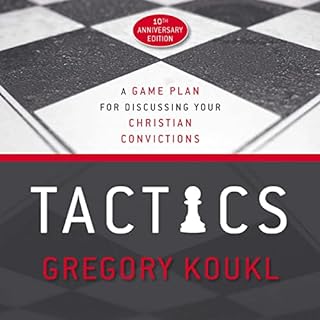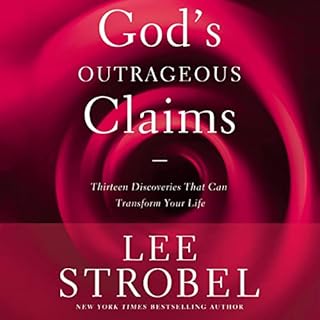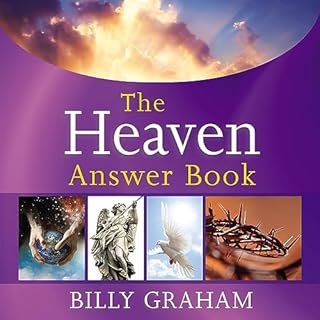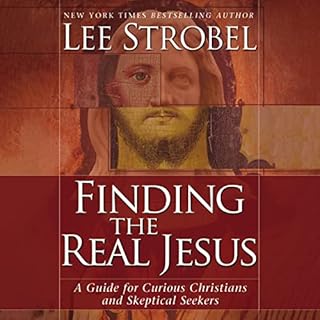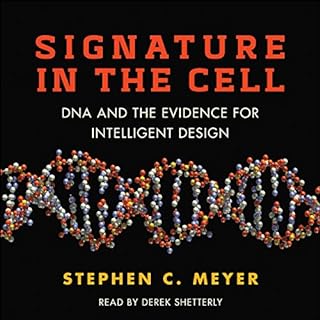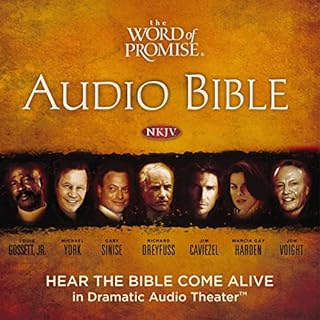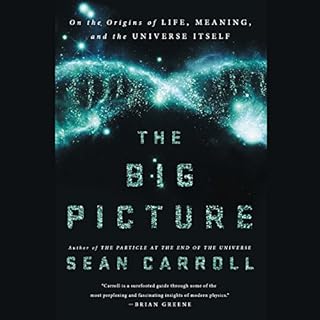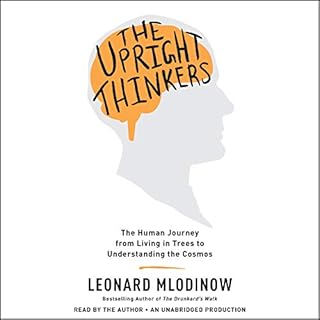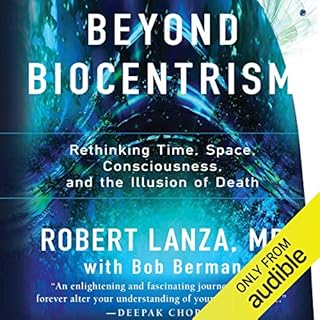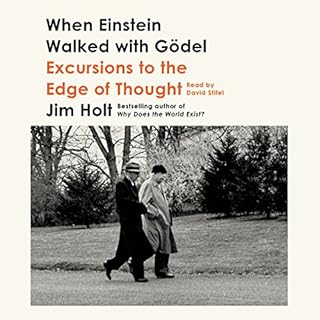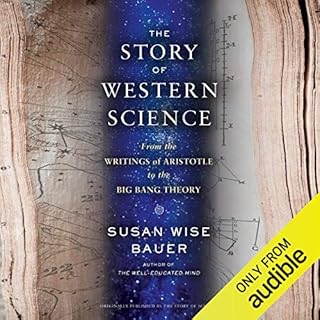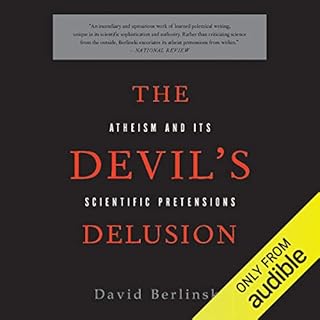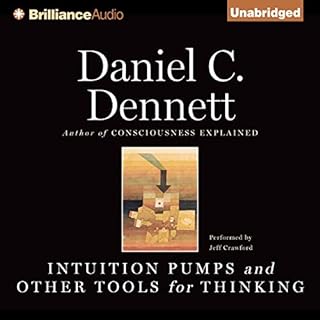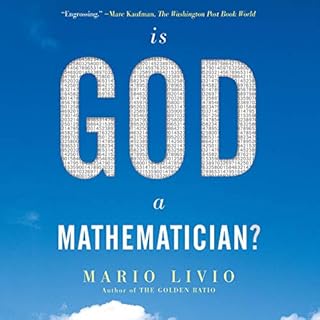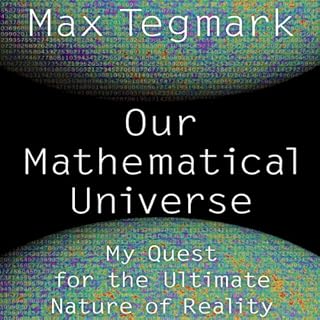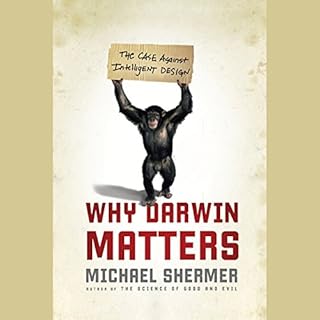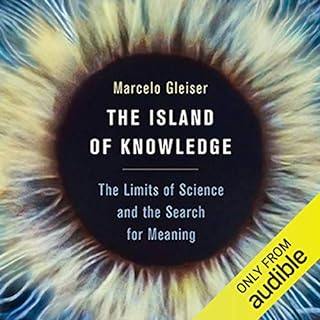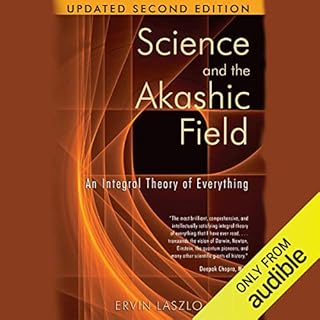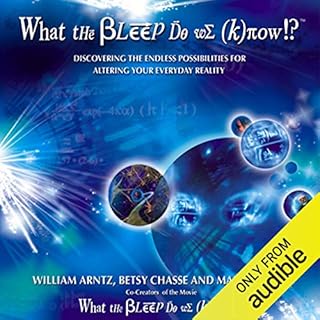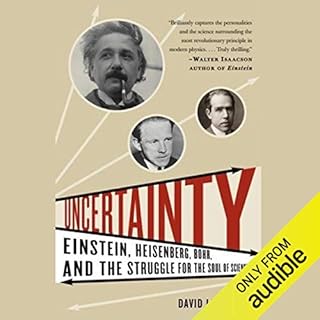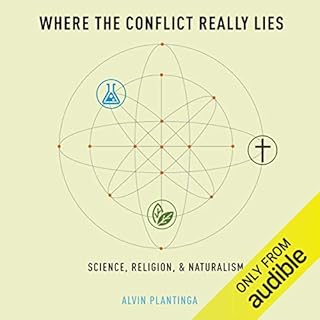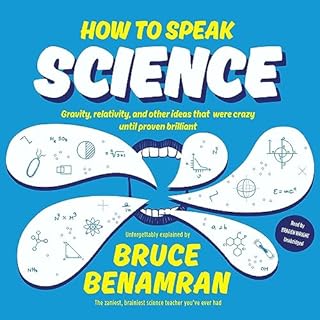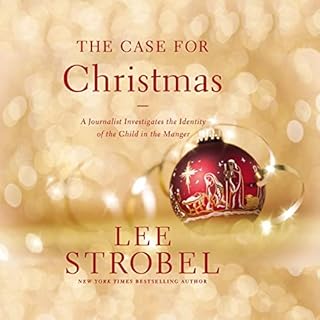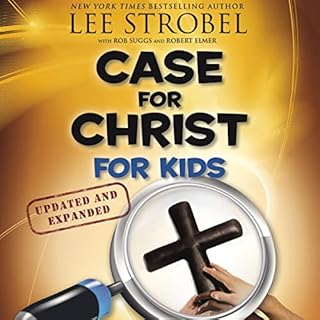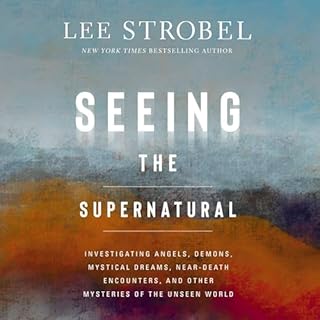
The Case for a Creator
No se pudo agregar al carrito
Add to Cart failed.
Error al Agregar a Lista de Deseos.
Error al eliminar de la lista de deseos.
Error al añadir a tu biblioteca
Error al seguir el podcast
Error al dejar de seguir el podcast
 Exclusivo para miembros Prime: ¿Nuevo en Audible? Obtén 2 audiolibros gratis con tu prueba.
Exclusivo para miembros Prime: ¿Nuevo en Audible? Obtén 2 audiolibros gratis con tu prueba.Compra ahora por $25.19
No default payment method selected.
We are sorry. We are not allowed to sell this product with the selected payment method
-
Narrado por:
-
Lee Strobel
-
De:
-
Lee Strobel
Acerca de esta escucha
Discover the astonishing evidence for intelligent design in this New York Times best-selling book by award-winning journalist Lee Strobel.
"My road to atheism was paved by science...but, ironically, so was my later journey to God," Strobel says.
During his academic years, Lee Strobel became convinced that God was obsolete, a belief that colored his journalism career. Science had made the idea of a creator irrelevant - or so Strobel thought.
But today science points in a different direction. A diverse and impressive body of research has increasingly supported the conclusion that the universe was intelligently designed. At the same time, Darwinism has faltered in the face of concrete facts and hard reason. Has science discovered God? At the very least, it's giving faith an immense boost, as new findings emerge about the incredible complexity of our universe.
Join Strobel as he reexamines the theories that once led him away from God. Through his compelling and highly readable account, you'll encounter the mind-stretching discoveries from cosmology, cellular biology, DNA research, astronomy, physics, and human consciousness that present compelling evidence in The Case for a Creator.
Also available: The Case for a Creator small group video study and study guide, Spanish edition, kids' edition, student edition, and more.
Suggested reading, study guide, and end notes are available in the audiobook companion PDF download.
PLEASE NOTE: When you purchase this title, the accompanying PDF will be available in your Audible Library along with the audio.
©2004 Lee Strobel (P)2004 Zondervan PublishingLos oyentes también disfrutaron...
-
The Case for Heaven
- A Journalist Investigates Evidence for Life After Death
- De: Lee Strobel
- Narrado por: Lee Strobel
- Duración: 8 h y 32 m
- Versión completa
-
General5 out of 5 stars 738
-
Narración:5 out of 5 stars 647
-
Historia5 out of 5 stars 640
In The Case for Heaven, best-selling author and investigative journalist turns a critical eye on the evidence for heaven, a variety of claims about the afterlife, and modern-day stories of near-death experiences to build a compelling case that death is not the end of our existence but a transition to an exciting and very real world to come.
-
5 out of 5 stars
-
Don’t miss it!
- De Jerry en 01-15-22
De: Lee Strobel
-
The Case for Christ, Revised & Updated
- A Journalist's Personal Investigation of the Evidence for Jesus
- De: Lee Strobel
- Narrado por: Lee Strobel
- Duración: 10 h y 49 m
- Versión completa
-
General5 out of 5 stars 5,141
-
Narración:5 out of 5 stars 4,552
-
Historia5 out of 5 stars 4,547
Is there credible proof that Jesus of Nazareth really is the Son of God? In The Case for Christ, Lee Strobel, former legal editor of the Chicago Tribune and New York Times bestselling author, retraces his own spiritual journey from atheism to faith and builds a captivating case for Christ's divinity. In this revised and updated edition of The Case for Christ, Strobel cross-examines a dozen experts with doctorates from schools such as Cambridge, Princeton, and Brandeis, asking hard-hitting questions—and taking a deeper look at the evidence from the fields of science, philosophy, and history.
-
5 out of 5 stars
-
Wow
- De Jeff Wedding en 09-07-17
De: Lee Strobel
-
The Case for Faith
- A Journalist Investigates the Toughest Objections to Christianity (Case for... Series)
- De: Lee Strobel
- Narrado por: Van Tracy
- Duración: 11 h y 39 m
- Versión completa
-
General5 out of 5 stars 152
-
Narración:5 out of 5 stars 130
-
Historia5 out of 5 stars 131
Best-selling author and former atheist Lee Strobel investigates the nettlesome issues and doubts of the heart that threaten faith, including doubt, the problem of pain, and the existence of evil. This updated edition features two all-new chapters, an updated list of recommended resources for further study, and a new discussion guide.
-
5 out of 5 stars
-
Great book!
- De Lara Ross en 02-22-23
De: Lee Strobel
-
The Case for the Real Jesus
- De: Lee Strobel
- Narrado por: Lee Strobel
- Duración: 10 h y 45 m
- Versión completa
-
General5 out of 5 stars 545
-
Narración:5 out of 5 stars 381
-
Historia5 out of 5 stars 376
Has modern scholarship debunked the traditional Christ? Has the church suppressed the truth about Jesus to advance its own agenda? What if the real Jesus is far different from the atoning Savior worshipped through the centuries? Evaluate the arguments and evidence being advanced by prominent atheists, liberal theologians, Muslim scholars, and others. Sift through expert testimony. Then reach your own verdict in The Case for the Real Jesus.
-
5 out of 5 stars
-
A Re-awakening.
- De Dan en 08-12-08
De: Lee Strobel
-
The Case for Miracles
- De: Lee Strobel
- Narrado por: Lee Strobel
- Duración: 7 h y 58 m
- Versión completa
-
General5 out of 5 stars 710
-
Narración:5 out of 5 stars 631
-
Historia5 out of 5 stars 629
This provocative audiobook starts with an unlikely interview in which America’s foremost skeptic builds a seemingly persuasive case against the miraculous. But then Strobel travels the country to quiz scholars to see whether they can offer solid answers to atheist objections. Along the way, he encounters astounding accounts of healings and other phenomena that simply cannot be explained away by naturalistic causes. The audiobook features the results of exclusive new scientific polling that shows miracle accounts are much more common than people think.
-
5 out of 5 stars
-
in-depth look at hard questions
- De MVF en 09-18-18
De: Lee Strobel
-
The Case for Hope
- Looking Ahead with Confidence and Courage
- De: Lee Strobel
- Narrado por: Lee Strobel
- Duración: 3 h y 23 m
- Versión completa
-
General5 out of 5 stars 99
-
Narración:5 out of 5 stars 92
-
Historia5 out of 5 stars 92
Lee Strobel's trademark investigative style paired with an uplifting message of the hope found in Jesus Christ. Lee's timeless message walks listeners through why holding on to hope is so crucial, why we can trust in the hope of Jesus Christ, and how that hope can change our lives for the better. Lee Strobel has already helped millions delve deeper into their faith and investigate the how and the why of what they believe.
-
5 out of 5 stars
-
Life's journey and destination
- De GOZUN en 08-22-16
De: Lee Strobel
-
The Case for Heaven
- A Journalist Investigates Evidence for Life After Death
- De: Lee Strobel
- Narrado por: Lee Strobel
- Duración: 8 h y 32 m
- Versión completa
-
General5 out of 5 stars 738
-
Narración:5 out of 5 stars 647
-
Historia5 out of 5 stars 640
In The Case for Heaven, best-selling author and investigative journalist turns a critical eye on the evidence for heaven, a variety of claims about the afterlife, and modern-day stories of near-death experiences to build a compelling case that death is not the end of our existence but a transition to an exciting and very real world to come.
-
5 out of 5 stars
-
Don’t miss it!
- De Jerry en 01-15-22
De: Lee Strobel
-
The Case for Christ, Revised & Updated
- A Journalist's Personal Investigation of the Evidence for Jesus
- De: Lee Strobel
- Narrado por: Lee Strobel
- Duración: 10 h y 49 m
- Versión completa
-
General5 out of 5 stars 5,141
-
Narración:5 out of 5 stars 4,552
-
Historia5 out of 5 stars 4,547
Is there credible proof that Jesus of Nazareth really is the Son of God? In The Case for Christ, Lee Strobel, former legal editor of the Chicago Tribune and New York Times bestselling author, retraces his own spiritual journey from atheism to faith and builds a captivating case for Christ's divinity. In this revised and updated edition of The Case for Christ, Strobel cross-examines a dozen experts with doctorates from schools such as Cambridge, Princeton, and Brandeis, asking hard-hitting questions—and taking a deeper look at the evidence from the fields of science, philosophy, and history.
-
5 out of 5 stars
-
Wow
- De Jeff Wedding en 09-07-17
De: Lee Strobel
-
The Case for Faith
- A Journalist Investigates the Toughest Objections to Christianity (Case for... Series)
- De: Lee Strobel
- Narrado por: Van Tracy
- Duración: 11 h y 39 m
- Versión completa
-
General5 out of 5 stars 152
-
Narración:5 out of 5 stars 130
-
Historia5 out of 5 stars 131
Best-selling author and former atheist Lee Strobel investigates the nettlesome issues and doubts of the heart that threaten faith, including doubt, the problem of pain, and the existence of evil. This updated edition features two all-new chapters, an updated list of recommended resources for further study, and a new discussion guide.
-
5 out of 5 stars
-
Great book!
- De Lara Ross en 02-22-23
De: Lee Strobel
-
The Case for the Real Jesus
- De: Lee Strobel
- Narrado por: Lee Strobel
- Duración: 10 h y 45 m
- Versión completa
-
General5 out of 5 stars 545
-
Narración:5 out of 5 stars 381
-
Historia5 out of 5 stars 376
Has modern scholarship debunked the traditional Christ? Has the church suppressed the truth about Jesus to advance its own agenda? What if the real Jesus is far different from the atoning Savior worshipped through the centuries? Evaluate the arguments and evidence being advanced by prominent atheists, liberal theologians, Muslim scholars, and others. Sift through expert testimony. Then reach your own verdict in The Case for the Real Jesus.
-
5 out of 5 stars
-
A Re-awakening.
- De Dan en 08-12-08
De: Lee Strobel
-
The Case for Miracles
- De: Lee Strobel
- Narrado por: Lee Strobel
- Duración: 7 h y 58 m
- Versión completa
-
General5 out of 5 stars 710
-
Narración:5 out of 5 stars 631
-
Historia5 out of 5 stars 629
This provocative audiobook starts with an unlikely interview in which America’s foremost skeptic builds a seemingly persuasive case against the miraculous. But then Strobel travels the country to quiz scholars to see whether they can offer solid answers to atheist objections. Along the way, he encounters astounding accounts of healings and other phenomena that simply cannot be explained away by naturalistic causes. The audiobook features the results of exclusive new scientific polling that shows miracle accounts are much more common than people think.
-
5 out of 5 stars
-
in-depth look at hard questions
- De MVF en 09-18-18
De: Lee Strobel
-
The Case for Hope
- Looking Ahead with Confidence and Courage
- De: Lee Strobel
- Narrado por: Lee Strobel
- Duración: 3 h y 23 m
- Versión completa
-
General5 out of 5 stars 99
-
Narración:5 out of 5 stars 92
-
Historia5 out of 5 stars 92
Lee Strobel's trademark investigative style paired with an uplifting message of the hope found in Jesus Christ. Lee's timeless message walks listeners through why holding on to hope is so crucial, why we can trust in the hope of Jesus Christ, and how that hope can change our lives for the better. Lee Strobel has already helped millions delve deeper into their faith and investigate the how and the why of what they believe.
-
5 out of 5 stars
-
Life's journey and destination
- De GOZUN en 08-22-16
De: Lee Strobel
-
Is God Real?
- Exploring the Ultimate Question of Life
- De: Lee Strobel
- Narrado por: Lee Strobel
- Duración: 6 h y 39 m
- Versión completa
-
General5 out of 5 stars 99
-
Narración:5 out of 5 stars 93
-
Historia5 out of 5 stars 93
More than two hundred times a second, around the world, questions about God's existence are being typed into search engines. Google alone provides nearly 4 million results to that single question. The topic of the existence of a Creator has enormous implications on our lives, including whether or not we have free will, if there's any such thing as an afterlife, and whether or not there's any basis for human morality. In Is God Real?, Lee Strobel pulls together material from his previous books to create this updated rational exploration of the proof of God's existence and the basis of our hope
-
4 out of 5 stars
-
Believe the Bible
- De Eddie Roop en 11-09-23
De: Lee Strobel
-
The Case for Grace
- A Journalist Explores the Evidence of Transformed Lives
- De: Lee Strobel
- Narrado por: Lee Strobel
- Duración: 5 h y 35 m
- Versión completa
-
General5 out of 5 stars 478
-
Narración:5 out of 5 stars 421
-
Historia5 out of 5 stars 421
In The Case for Grace, Lee offers an accessible explanation of the theology of God's grace, shown through the incredible, dramatic, can't-put-it-down stories of people whose lives were changed by the gift of grace--true accounts of people whose transformation and renewal are so radical that they seem to be best explained as the work of a gracious God.
-
5 out of 5 stars
-
His best book so far, & Case for Christ was great.
- De M. Silen en 05-21-15
De: Lee Strobel
-
Seeking Allah, Finding Jesus
- Third Edition with Bonus Content, New Reflections
- De: Nabeel Qureshi, Lee Strobel - foreword
- Narrado por: Nabeel Qureshi, Michelle Qureshi, Lee Strobel, y otros
- Duración: 8 h y 51 m
- Versión completa
-
General5 out of 5 stars 3,897
-
Narración:5 out of 5 stars 3,474
-
Historia5 out of 5 stars 3,466
In Seeking Allah, Finding Jesus, now expanded with new bonus content, Nabeel Qureshi describes his dramatic journey from Islam to Christianity, complete with friendships, investigations, and supernatural dreams along the way. Providing an intimate window into a loving Muslim home, Qureshi shares how he developed a passion for Islam before discovering, almost against his will, evidence that Jesus rose from the dead and claimed to be God.
-
5 out of 5 stars
-
INCREDIBLE!!! This book affected me greatly!!!
- De Maria en 08-24-18
De: Nabeel Qureshi, y otros
-
Evidence That Demands a Verdict
- Life-Changing Truth for a Skeptical World
- De: Josh McDowell, Sean McDowell PhD
- Narrado por: Josh McDowell, Sean McDowell PhD, Bob Souer
- Duración: 42 h y 39 m
- Versión completa
-
General4.5 out of 5 stars 578
-
Narración:4.5 out of 5 stars 483
-
Historia4.5 out of 5 stars 483
The modern apologetics classic that started it all is now completely revised and updated - because the truth of the Bible doesn't change, but its critics do. With the original Evidence That Demands a Verdict, best-selling author Josh McDowell gave Christian audiences the answers they needed to defend their faith against the harshest critics and skeptics. Now, with his son Sean McDowell, Josh McDowell has updated and expanded this classic resource for a new generation. This is a book that invites listeners to bring their doubts.
-
5 out of 5 stars
-
Lexicons aren't best suited for Audible
- De Leifen en 10-24-17
De: Josh McDowell, y otros
-
The Case for Easter: A Journalist Investigates Evidence for the Resurrection
- Case for... Series
- De: Lee Strobel
- Narrado por: Lee Strobel
- Duración: 2 h y 28 m
- Versión completa
-
General5 out of 5 stars 172
-
Narración:5 out of 5 stars 147
-
Historia5 out of 5 stars 147
Of the many world religions, only one claims that its founder returned from the grave. The resurrection of Jesus Christ is the very cornerstone of Christianity. But a dead man coming back to life? In our sophisticated age, when myth has given way to science, who can take such a claim seriously? How credible is the evidence for - and against - the resurrection? Focusing his award-winning skills as a legal journalist on history's most compelling enigma, Lee Strobel retraces the startling findings that led him from atheism to belief.
-
4 out of 5 stars
-
Interesting read. answered many questions I had.
- De Amazon Customer en 04-12-22
De: Lee Strobel
-
Tactics, 10th Anniversary Edition
- A Game Plan for Discussing Your Christian Convictions
- De: Gregory Koukl, Lee Strobel - foreword
- Narrado por: Gregory Koukl
- Duración: 9 h y 19 m
- Versión completa
-
General5 out of 5 stars 1,252
-
Narración:5 out of 5 stars 1,083
-
Historia5 out of 5 stars 1,074
In a culture increasingly indifferent or even hostile to Christian truth, followers of Christ need to be equipped to communicate with those who do not speak their language or accept their source of authority. In Tactics, 10th Anniversary Edition, Gregory Koukl demonstrates how to artfully regain control of conversations, keeping them moving forward in constructive ways through thoughtful diplomacy. Step-by-step, you'll learn the tactics of good persuasion and defense, how to identify the tactics of your opponent, and how to build your case, patiently and practically.
-
5 out of 5 stars
-
Awesome Book
- De Dee Venable en 12-06-19
De: Gregory Koukl, y otros
-
God's Outrageous Claims
- Discover What They Mean for You
- De: Lee Strobel
- Narrado por: Lee Strobel
- Duración: 7 h y 48 m
- Versión completa
-
General4.5 out of 5 stars 192
-
Narración:4.5 out of 5 stars 94
-
Historia4.5 out of 5 stars 93
Lee Strobel’s insights into the benefits of living as a fully devoted follower of Christ are refreshing and powerfully relevant. Using true stories, including his own, he shows that Christianity really works, that we really can live transformed, authentic, and effective lives - and that God’s promises and power are very real and very true.
-
5 out of 5 stars
-
insightful look into christians and our faith
- De Ken en 11-18-05
De: Lee Strobel
-
The Heaven Answer Book
- Answers to Over 100 of Your Pressing Questions about Eternal Life, Salvation, and Life After Death
- De: Billy Graham
- Narrado por: Maurice England
- Duración: 2 h y 53 m
- Versión completa
-
General5 out of 5 stars 60
-
Narración:5 out of 5 stars 53
-
Historia5 out of 5 stars 53
World-renowned author, preacher, and evangelist Reverend Billy Graham answers questions about heaven and eternity with understanding and reassurance. God's Word says heaven awaits all the saints of his kingdom, but what will heaven be like? The Heaven Answer Book is biblically based and written in an easy-to-understand question-and-answer format.
-
5 out of 5 stars
-
Wonderful
- De Josephblu en 11-19-20
De: Billy Graham
-
Finding the Real Jesus
- A Guide for Curious Christians and Skeptical Seekers
- De: Lee Strobel
- Narrado por: Mark Smeby
- Duración: 2 h y 18 m
- Versión completa
-
General5 out of 5 stars 11
-
Narración:5 out of 5 stars 9
-
Historia5 out of 5 stars 9
For centuries, the Christian church has taught that Jesus is the divine Son of God, crucified for sinners and raised from the dead. In recent years, however, that picture of Jesus has come under widely publicized attack from sources ranging from critical scholars to Internet pundits to popular historians and others. New York Times bestselling author Lee Strobel helps you separate truth from media hype, sound scholarship from bias, and fact from speculation. Digging below the surface, this book provides credible, informed answers to today's most pressing questions about Jesus.
-
5 out of 5 stars
-
Great read!
- De James E Friend en 03-07-23
De: Lee Strobel
-
Signature in the Cell
- DNA and the Evidence for Intelligent Design
- De: Stephen C. Meyer
- Narrado por: Derek Shetterly
- Duración: 19 h y 16 m
- Versión completa
-
General4.5 out of 5 stars 528
-
Narración:5 out of 5 stars 466
-
Historia4.5 out of 5 stars 461
Named one of the top books of 2009 by the Times Literary Supplement (London), this controversial and compelling audiobook from Dr. Stephen C. Meyer presents a convincing new case for intelligent design (ID) based on revolutionary discoveries in science and DNA. Along the way Meyer argues that Charles Darwin's theory of evolution as expounded in The Origin of Species did not, in fact, refute ID.
-
5 out of 5 stars
-
Intelligent Design vs Chance
- De Nevin en 03-03-17
De: Stephen C. Meyer
-
The Word of Promise Audio Bible—New King James Version, NKJV: Complete Bible
- De: Thomas Nelson Inc.
- Narrado por: Jason Alexander, Joan Allen, Richard Dreyfuss, y otros
- Duración: 98 h y 1 m
- Versión completa
-
General4.5 out of 5 stars 9,785
-
Narración:4.5 out of 5 stars 8,057
-
Historia5 out of 5 stars 8,049
With an original music score by composer Stefano Mainetti (Abba Pater), feature-film quality sound effects, and compelling narration by Michael York and the work of over 500 actors, the The Word of Promise Audio Bible will immerse listeners in the dramatic reality of the scriptures as never before. Each beloved book of the Bible comes to life with outstanding performances by Jim Caviezel as Jesus, Richard Dreyfuss as Moses, Gary Sinise as David, Jason Alexander as Joseph, Marisa Tomei as Mary Magdalene, Stacy Keach as Paul, Louis Gossett, Jr. as John...
-
4 out of 5 stars
-
Lovely...needs a section guide. I made one
- De A. Lee en 08-29-16
-
Return of the God Hypothesis
- Three Scientific Discoveries That Reveal the Mind Behind the Universe
- De: Stephen C. Meyer
- Narrado por: Timothy Andrés Pabon
- Duración: 18 h y 49 m
- Versión completa
-
General5 out of 5 stars 765
-
Narración:5 out of 5 stars 668
-
Historia5 out of 5 stars 663
The New York Times best-selling author of Darwin’s Doubt presents groundbreaking scientific evidence of the existence of God, based on breakthroughs in physics, cosmology, and biology.
-
5 out of 5 stars
-
A Wonderful Culmination of Dr. Meyer’s Work
- De Trevor Rolls en 03-31-21
De: Stephen C. Meyer
Reseñas de la Crítica
"This solid introduction to the most important topics in origins debates is highly accessible and packs a good argumentative punch." (Publishers Weekly)
Relacionado con este tema
-
The Big Picture
- On the Origins of Life, Meaning, and the Universe Itself
- De: Sean Carroll
- Narrado por: Sean Carroll
- Duración: 17 h y 22 m
- Versión completa
-
General4.5 out of 5 stars 3,136
-
Narración:4.5 out of 5 stars 2,761
-
Historia4.5 out of 5 stars 2,732
Already internationally acclaimed for his elegant, lucid writing on the most challenging notions in modern physics, Sean Carroll is emerging as one of the greatest humanist thinkers of his generation as he brings his extraordinary intellect to bear not only on the Higgs boson and extra dimensions but now also on our deepest personal questions. Where are we? Who are we? Are our emotions, our beliefs, and our hopes and dreams ultimately meaningless out there in the void?
-
5 out of 5 stars
-
ABSOLUTE MUST READ!
- De serine en 05-12-16
De: Sean Carroll
-
The Varieties of Scientific Experience
- A Personal View of the Search for God
- De: Carl Sagan, Ann Druyan - editor
- Narrado por: Adrienne C. Moore, Ann Druyan
- Duración: 7 h y 34 m
- Versión completa
-
General5 out of 5 stars 177
-
Narración:4.5 out of 5 stars 155
-
Historia5 out of 5 stars 152
The late great astronomer and astrophysicist describes his personal search to understand the nature of the sacred in the vastness of the cosmos. Exhibiting a breadth of intellect nothing short of astounding, Sagan presents his views on a wide range of topics, including the likelihood of intelligent life on other planets, creationism and so-called intelligent design.
-
4 out of 5 stars
-
Sagan's lectures about the possibility of God
- De David T. en 11-13-17
De: Carl Sagan, y otros
-
The Upright Thinkers
- The Human Journey From Living in Trees to Understanding the Cosmos
- De: Leonard Mlodinow
- Narrado por: Leonard Mlodinow
- Duración: 12 h y 29 m
- Versión completa
-
General4.5 out of 5 stars 202
-
Narración:4.5 out of 5 stars 178
-
Historia4.5 out of 5 stars 179
In this fascinating and illuminating work, Leonard Mlodinow guides us through the critical eras and events in the development of science, all of which, he demonstrates, were propelled forward by humankind's collective struggle to know. From the birth of reasoning and culture to the formation of the studies of physics, chemistry, biology, and modern-day quantum physics, we come to see that much of our progress can be attributed to simple questions - why? how? - bravely asked.
-
5 out of 5 stars
-
10/10 Got What I Wanted.
- De Austin en 09-22-15
De: Leonard Mlodinow
-
Beyond Biocentrism
- Rethinking Time, Space, Consciousness, and the Illusion of Death
- De: Robert Lanza, Bob Berman
- Narrado por: Peter Ganim
- Duración: 7 h y 16 m
- Versión completa
-
General4.5 out of 5 stars 688
-
Narración:4.5 out of 5 stars 601
-
Historia4.5 out of 5 stars 591
In Beyond Biocentrism, acclaimed biologist Robert Lanza and astronomer Bob Berman take the listener on an intellectual thrill ride as they reexamine everything we thought we knew about life, death, the universe, and the nature of reality itself. The first step is acknowledging that our existing model of reality is looking increasingly creaky in the face of recent scientific discoveries.
-
5 out of 5 stars
-
Here's the thing
- De Mikal en 11-09-18
De: Robert Lanza, y otros
-
When Einstein Walked with Gödel
- Excursions to the Edge of Thought
- De: Jim Holt
- Narrado por: David Stifel
- Duración: 15 h y 19 m
- Versión completa
-
General4.5 out of 5 stars 636
-
Narración:4.5 out of 5 stars 539
-
Historia4.5 out of 5 stars 541
Does time exist? What is infinity? Why do mirrors reverse left and right but not up and down? In this scintillating collection, Holt explores the human mind, the cosmos, and the thinkers who’ve tried to encompass the latter with the former. With his trademark clarity and humor, Holt probes the mysteries of quantum mechanics, the quest for the foundations of mathematics, and the nature of logic and truth. Along the way, he offers intimate biographical sketches of celebrated and neglected thinkers, from the physicist Emmy Noether to the computing pioneer Alan Turing and the discoverer of fractals, Benoit Mandelbrot.
-
5 out of 5 stars
-
A good overview of scientific theory
- De MJ Walters en 09-11-18
De: Jim Holt
-
The Story of Western Science
- From the Writings of Aristotle to the Big Bang Theory
- De: Susan Wise Bauer
- Narrado por: Julian Elfer
- Duración: 8 h y 3 m
- Versión completa
-
General4.5 out of 5 stars 292
-
Narración:4.5 out of 5 stars 249
-
Historia4.5 out of 5 stars 254
Far too often, public discussion of science is carried out by journalists, voters, and politicians who have received their science secondhand. The Story of Western Science shows us the joy and importance of reading groundbreaking science writing for ourselves and guides us back to the masterpieces that have changed the way we think about our world, our cosmos, and ourselves.
-
4 out of 5 stars
-
Good text, tedious book structure
- De Diane K. en 10-07-15
De: Susan Wise Bauer
-
The Big Picture
- On the Origins of Life, Meaning, and the Universe Itself
- De: Sean Carroll
- Narrado por: Sean Carroll
- Duración: 17 h y 22 m
- Versión completa
-
General4.5 out of 5 stars 3,136
-
Narración:4.5 out of 5 stars 2,761
-
Historia4.5 out of 5 stars 2,732
Already internationally acclaimed for his elegant, lucid writing on the most challenging notions in modern physics, Sean Carroll is emerging as one of the greatest humanist thinkers of his generation as he brings his extraordinary intellect to bear not only on the Higgs boson and extra dimensions but now also on our deepest personal questions. Where are we? Who are we? Are our emotions, our beliefs, and our hopes and dreams ultimately meaningless out there in the void?
-
5 out of 5 stars
-
ABSOLUTE MUST READ!
- De serine en 05-12-16
De: Sean Carroll
-
The Varieties of Scientific Experience
- A Personal View of the Search for God
- De: Carl Sagan, Ann Druyan - editor
- Narrado por: Adrienne C. Moore, Ann Druyan
- Duración: 7 h y 34 m
- Versión completa
-
General5 out of 5 stars 177
-
Narración:4.5 out of 5 stars 155
-
Historia5 out of 5 stars 152
The late great astronomer and astrophysicist describes his personal search to understand the nature of the sacred in the vastness of the cosmos. Exhibiting a breadth of intellect nothing short of astounding, Sagan presents his views on a wide range of topics, including the likelihood of intelligent life on other planets, creationism and so-called intelligent design.
-
4 out of 5 stars
-
Sagan's lectures about the possibility of God
- De David T. en 11-13-17
De: Carl Sagan, y otros
-
The Upright Thinkers
- The Human Journey From Living in Trees to Understanding the Cosmos
- De: Leonard Mlodinow
- Narrado por: Leonard Mlodinow
- Duración: 12 h y 29 m
- Versión completa
-
General4.5 out of 5 stars 202
-
Narración:4.5 out of 5 stars 178
-
Historia4.5 out of 5 stars 179
In this fascinating and illuminating work, Leonard Mlodinow guides us through the critical eras and events in the development of science, all of which, he demonstrates, were propelled forward by humankind's collective struggle to know. From the birth of reasoning and culture to the formation of the studies of physics, chemistry, biology, and modern-day quantum physics, we come to see that much of our progress can be attributed to simple questions - why? how? - bravely asked.
-
5 out of 5 stars
-
10/10 Got What I Wanted.
- De Austin en 09-22-15
De: Leonard Mlodinow
-
Beyond Biocentrism
- Rethinking Time, Space, Consciousness, and the Illusion of Death
- De: Robert Lanza, Bob Berman
- Narrado por: Peter Ganim
- Duración: 7 h y 16 m
- Versión completa
-
General4.5 out of 5 stars 688
-
Narración:4.5 out of 5 stars 601
-
Historia4.5 out of 5 stars 591
In Beyond Biocentrism, acclaimed biologist Robert Lanza and astronomer Bob Berman take the listener on an intellectual thrill ride as they reexamine everything we thought we knew about life, death, the universe, and the nature of reality itself. The first step is acknowledging that our existing model of reality is looking increasingly creaky in the face of recent scientific discoveries.
-
5 out of 5 stars
-
Here's the thing
- De Mikal en 11-09-18
De: Robert Lanza, y otros
-
When Einstein Walked with Gödel
- Excursions to the Edge of Thought
- De: Jim Holt
- Narrado por: David Stifel
- Duración: 15 h y 19 m
- Versión completa
-
General4.5 out of 5 stars 636
-
Narración:4.5 out of 5 stars 539
-
Historia4.5 out of 5 stars 541
Does time exist? What is infinity? Why do mirrors reverse left and right but not up and down? In this scintillating collection, Holt explores the human mind, the cosmos, and the thinkers who’ve tried to encompass the latter with the former. With his trademark clarity and humor, Holt probes the mysteries of quantum mechanics, the quest for the foundations of mathematics, and the nature of logic and truth. Along the way, he offers intimate biographical sketches of celebrated and neglected thinkers, from the physicist Emmy Noether to the computing pioneer Alan Turing and the discoverer of fractals, Benoit Mandelbrot.
-
5 out of 5 stars
-
A good overview of scientific theory
- De MJ Walters en 09-11-18
De: Jim Holt
-
The Story of Western Science
- From the Writings of Aristotle to the Big Bang Theory
- De: Susan Wise Bauer
- Narrado por: Julian Elfer
- Duración: 8 h y 3 m
- Versión completa
-
General4.5 out of 5 stars 292
-
Narración:4.5 out of 5 stars 249
-
Historia4.5 out of 5 stars 254
Far too often, public discussion of science is carried out by journalists, voters, and politicians who have received their science secondhand. The Story of Western Science shows us the joy and importance of reading groundbreaking science writing for ourselves and guides us back to the masterpieces that have changed the way we think about our world, our cosmos, and ourselves.
-
4 out of 5 stars
-
Good text, tedious book structure
- De Diane K. en 10-07-15
De: Susan Wise Bauer
-
The Devil's Delusion
- Atheism and its Scientific Pretensions
- De: David Berlinski
- Narrado por: Dennis Holland
- Duración: 6 h y 7 m
- Versión completa
-
General4.5 out of 5 stars 654
-
Narración:4.5 out of 5 stars 561
-
Historia4.5 out of 5 stars 562
Militant atheism is on the rise. In recent years, Richard Dawkins, Sam Harris, Daniel Dennett, and Christopher Hitchens have produced a steady stream of best-selling books denigrating religious belief. These authors are merely the leading edge of a larger movement that includes much of the scientific community. In response, mathematician David Berlinski, himself a secular Jew, delivers a biting defense of religious thought.
-
2 out of 5 stars
-
Riddled With Problems
- De Ben en 11-01-13
De: David Berlinski
-
Intuition Pumps and Other Tools for Thinking
- De: Daniel C. Dennett
- Narrado por: Jeff Crawford
- Duración: 13 h y 22 m
- Versión completa
-
General4 out of 5 stars 426
-
Narración:4 out of 5 stars 363
-
Historia4 out of 5 stars 357
Over a storied career, Daniel C. Dennett has engaged questions about science and the workings of the mind. His answers have combined rigorous argument with strong empirical grounding. And a lot of fun. Intuition Pumps and Other Tools for Thinking offers seventy-seven of Dennett’s most successful “imagination-extenders and focus-holders” meant to guide you through some of life’s most treacherous subject matter: evolution, meaning, mind, and free will.
-
4 out of 5 stars
-
Loved it, but some philosophy background needed.
- De LongerILiveLessIKnow en 11-14-13
-
Is God a Mathematician?
- De: Mario Livio
- Narrado por: Tom Parks
- Duración: 9 h y 4 m
- Versión completa
-
General4.5 out of 5 stars 71
-
Narración:4.5 out of 5 stars 62
-
Historia4.5 out of 5 stars 62
Nobel Laureate Eugene Wigner once wondered about "the unreasonable effectiveness of mathematics" in the formulation of the laws of nature. Is God a Mathematician? investigates why mathematics is as powerful as it is. From ancient times to the present, scientists and philosophers have marveled at how such a seemingly abstract discipline could so perfectly explain the natural world. More than that - mathematics has often made predictions, for example, about subatomic particles or cosmic phenomena that were unknown at the time, but later were proven to be true.
-
5 out of 5 stars
-
Origins of Mathematics
- De Rick B en 07-08-21
De: Mario Livio
-
Our Mathematical Universe
- My Quest for the Ultimate Nature of Reality
- De: Max Tegmark
- Narrado por: Rob Shapiro
- Duración: 15 h y 22 m
- Versión completa
-
General4.5 out of 5 stars 2,511
-
Narración:4.5 out of 5 stars 2,195
-
Historia4.5 out of 5 stars 2,186
Max Tegmark leads us on an astonishing journey through past, present and future, and through the physics, astronomy, and mathematics that are the foundation of his work, most particularly his hypothesis that our physical reality is a mathematical structure and his theory of the ultimate multiverse. In a dazzling combination of both popular and groundbreaking science, he not only helps us grasp his often mind-boggling theories, but he also shares with us some of the often surprising triumphs and disappointments that have shaped his life as a scientist.
-
5 out of 5 stars
-
Wow!
- De Michael en 02-02-14
De: Max Tegmark
-
Why Does the World Exist?
- An Existential Detective Story
- De: Jim Holt
- Narrado por: Steven Menasche
- Duración: 11 h y 47 m
- Versión completa
-
General4 out of 5 stars 300
-
Narración:4 out of 5 stars 258
-
Historia4 out of 5 stars 254
Author Jim Holt explores the greatest metaphysical mystery of all: why is there something rather than nothing? This runaway best seller, which has captured the imagination of critics and the public alike, traces our latest efforts to grasp the origins of the universe. Holt adopts the role of cosmological detective, traveling the globe to interview a host of celebrated scientists, philosophers, and writers.
-
4 out of 5 stars
-
Fatal Reader Flaw
- De Let's Be Reasonable en 05-09-14
De: Jim Holt
-
Why Darwin Matters
- The Case for Evolution and Against Intelligent Design
- De: Michael Shermer
- Narrado por: uncredited
- Duración: 4 h y 22 m
- Versión resumida
-
General4.5 out of 5 stars 170
-
Narración:4.5 out of 5 stars 105
-
Historia4.5 out of 5 stars 105
Columnist and publisher Michael Shermer, once an evangelical Christian and a creationist, argues that Intelligent Design proponents invoke a combination of ad science, political antipathy, and flawed theology in their new brand of creationism. He refutes their pseudoscientific arguments and then demonstrates why conservatives and people of faith can and should embrace evolution. Why Darwin Matters is an incisive examination of what is at stake in the debate over evolution.
-
1 out of 5 stars
-
TOTAL MISREPRENTATION: WHERE IS THE EVIDENCE?
- De Theo Tsourdalakis en 09-04-11
De: Michael Shermer
-
The Island of Knowledge
- The Limits of Science and the Search for Meaning
- De: Marcelo Gleiser
- Narrado por: William Neenan
- Duración: 10 h y 33 m
- Versión completa
-
General4 out of 5 stars 552
-
Narración:4.5 out of 5 stars 488
-
Historia4 out of 5 stars 486
How much can we know about the world? In this audiobook physicist Marcelo Gleiser traces our search for answers to the most fundamental questions of existence, the origin of the universe, the nature of reality, and the limits of knowledge. In so doing he reaches a provocative conclusion: Science, like religion, is fundamentally limited as a tool for understanding the world. As science and its philosophical interpretations advance, we face the unsettling recognition of how much we don't know.
-
4 out of 5 stars
-
Island of knowledge
- De Joshua Kring en 07-26-15
De: Marcelo Gleiser
-
Science and the Akashic Field
- An Integral Theory of Everything
- De: Ervin Laszlo
- Narrado por: Tom Pile
- Duración: 6 h y 52 m
- Versión completa
-
General4.5 out of 5 stars 314
-
Narración:4.5 out of 5 stars 264
-
Historia4.5 out of 5 stars 262
Mystics and sages have long maintained that there exists an interconnecting cosmic field at the roots of reality that conserves and conveys information, a field known as the Akashic record. Recent discoveries in vacuum physics show that this Akashic field is real and has its equivalent in science's zero-point field that underlies space itself. This field consists of a subtle sea of fluctuating energies from which all things arise: atoms and galaxies, stars and planets, living beings, and even consciousness.
-
4 out of 5 stars
-
A must-read about ultimate nature of reality
- De Alexandra Hopkins en 04-15-18
De: Ervin Laszlo
-
What the Bleep Do We Know
- Discovering the Endless Possibilities for Altering Your Everyday Reality
- De: William Arntz, Betsy Chase, Mark Vicente
- Narrado por: Suzanne Toren
- Duración: 11 h y 25 m
- Versión completa
-
General4 out of 5 stars 436
-
Narración:4 out of 5 stars 320
-
Historia4 out of 5 stars 323
With the help of 14 leading physicists, scientists, and spiritual thinkers, this book guides listeners on a course from the scientific to the spiritual, and from the universal to the personal. Along the way, it asks such questions as: Are we seeing the world as it really is What is the relationship between our thoughts and our world? How can I create my day every day? What the Bleep answers this question and others through an innovative new approach to self-help and spirituality.
-
1 out of 5 stars
-
Attacking straw men
- De Henrik en 08-06-11
De: William Arntz, y otros
-
Uncertainty
- Einstein, Heisenberg, Bohr, and the Struggle for the Soul of Science
- De: David Lindley
- Narrado por: Robert Blumenfeld
- Duración: 7 h y 2 m
- Versión completa
-
General4 out of 5 stars 371
-
Narración:4 out of 5 stars 209
-
Historia4.5 out of 5 stars 210
Werner Heisenberg's "uncertainty principle" challenged centuries of scientific understanding, placed him in direct opposition to Albert Einstein, and put Niels Bohr in the middle of one of the most heated debates in scientific history. Heisenberg's theorem stated that there were physical limits to what we could know about sub-atomic particles; this "uncertainty" would have shocking implications.
-
4 out of 5 stars
-
fascinating insight into the real drama of physics
- De Ryan en 09-07-10
De: David Lindley
-
Where the Conflict Really Lies
- Science, Religion, & Naturalism
- De: Alvin Plantinga
- Narrado por: Michael Butler Murray
- Duración: 12 h y 43 m
- Versión completa
-
General4.5 out of 5 stars 258
-
Narración:4.5 out of 5 stars 225
-
Historia4.5 out of 5 stars 225
This audiobook is a long-awaited major statement by a pre-eminent analytic philosopher, Alvin Plantinga, on one of our biggest debates - the compatibility of science and religion. The last twenty years has seen a cottage industry of books on this divide, but with little consensus emerging. Plantinga, as a top philosopher but also a proponent of the rationality of religious belief, has a unique contribution to make. His theme in this short book is that the conflict between science and theistic religion is actually superficial, and that at a deeper level they are in concord.
-
2 out of 5 stars
-
The reader makes or breaks an audiobook.
- De Alec en 02-16-15
De: Alvin Plantinga
-
How to Speak Science
- Gravity, Relativity, and Other Ideas That Were Crazy Until Proven Brilliant
- De: Bruce Benamran, Stephanie Delozier Strobel
- Narrado por: Braden Wright
- Duración: 13 h y 11 m
- Versión completa
-
General4.5 out of 5 stars 219
-
Narración:4.5 out of 5 stars 196
-
Historia4.5 out of 5 stars 192
As smartphones, supercomputers, supercolliders, and AI propel us into an ever more unfamiliar future, How to Speak Science takes us on a rollicking historical tour of the greatest discoveries and ideas that make today's cutting-edge technologies possible. Wanting everyone to be able to "speak" science, YouTube science guru Bruce Benamran explains - as accessibly and wittily as in his acclaimed videos - the fundamental ideas of the physical world: matter, life, the solar system, light, electromagnetism, thermodynamics, special and general relativity, and much more.
-
5 out of 5 stars
-
Wowzers!
- De Ralph Temblador en 02-15-21
De: Bruce Benamran, y otros
Las personas que vieron esto también vieron...
-
The Case for Faith
- A Journalist Investigates the Toughest Objections to Christianity (Case for... Series)
- De: Lee Strobel
- Narrado por: Van Tracy
- Duración: 11 h y 39 m
- Versión completa
-
General5 out of 5 stars 152
-
Narración:5 out of 5 stars 130
-
Historia5 out of 5 stars 131
Best-selling author and former atheist Lee Strobel investigates the nettlesome issues and doubts of the heart that threaten faith, including doubt, the problem of pain, and the existence of evil. This updated edition features two all-new chapters, an updated list of recommended resources for further study, and a new discussion guide.
-
5 out of 5 stars
-
Great book!
- De Lara Ross en 02-22-23
De: Lee Strobel
-
The Case for Heaven
- A Journalist Investigates Evidence for Life After Death
- De: Lee Strobel
- Narrado por: Lee Strobel
- Duración: 8 h y 32 m
- Versión completa
-
General5 out of 5 stars 738
-
Narración:5 out of 5 stars 647
-
Historia5 out of 5 stars 640
In The Case for Heaven, best-selling author and investigative journalist turns a critical eye on the evidence for heaven, a variety of claims about the afterlife, and modern-day stories of near-death experiences to build a compelling case that death is not the end of our existence but a transition to an exciting and very real world to come.
-
5 out of 5 stars
-
Don’t miss it!
- De Jerry en 01-15-22
De: Lee Strobel
-
The Case for Grace
- A Journalist Explores the Evidence of Transformed Lives
- De: Lee Strobel
- Narrado por: Lee Strobel
- Duración: 5 h y 35 m
- Versión completa
-
General5 out of 5 stars 478
-
Narración:5 out of 5 stars 421
-
Historia5 out of 5 stars 421
In The Case for Grace, Lee offers an accessible explanation of the theology of God's grace, shown through the incredible, dramatic, can't-put-it-down stories of people whose lives were changed by the gift of grace--true accounts of people whose transformation and renewal are so radical that they seem to be best explained as the work of a gracious God.
-
5 out of 5 stars
-
His best book so far, & Case for Christ was great.
- De M. Silen en 05-21-15
De: Lee Strobel
-
The Case for the Real Jesus
- De: Lee Strobel
- Narrado por: Lee Strobel
- Duración: 10 h y 45 m
- Versión completa
-
General5 out of 5 stars 545
-
Narración:5 out of 5 stars 381
-
Historia5 out of 5 stars 376
Has modern scholarship debunked the traditional Christ? Has the church suppressed the truth about Jesus to advance its own agenda? What if the real Jesus is far different from the atoning Savior worshipped through the centuries? Evaluate the arguments and evidence being advanced by prominent atheists, liberal theologians, Muslim scholars, and others. Sift through expert testimony. Then reach your own verdict in The Case for the Real Jesus.
-
5 out of 5 stars
-
A Re-awakening.
- De Dan en 08-12-08
De: Lee Strobel
-
Is God Real?
- Exploring the Ultimate Question of Life
- De: Lee Strobel
- Narrado por: Lee Strobel
- Duración: 6 h y 39 m
- Versión completa
-
General5 out of 5 stars 99
-
Narración:5 out of 5 stars 93
-
Historia5 out of 5 stars 93
More than two hundred times a second, around the world, questions about God's existence are being typed into search engines. Google alone provides nearly 4 million results to that single question. The topic of the existence of a Creator has enormous implications on our lives, including whether or not we have free will, if there's any such thing as an afterlife, and whether or not there's any basis for human morality. In Is God Real?, Lee Strobel pulls together material from his previous books to create this updated rational exploration of the proof of God's existence and the basis of our hope
-
4 out of 5 stars
-
Believe the Bible
- De Eddie Roop en 11-09-23
De: Lee Strobel
-
The Case for Miracles
- De: Lee Strobel
- Narrado por: Lee Strobel
- Duración: 7 h y 58 m
- Versión completa
-
General5 out of 5 stars 710
-
Narración:5 out of 5 stars 631
-
Historia5 out of 5 stars 629
This provocative audiobook starts with an unlikely interview in which America’s foremost skeptic builds a seemingly persuasive case against the miraculous. But then Strobel travels the country to quiz scholars to see whether they can offer solid answers to atheist objections. Along the way, he encounters astounding accounts of healings and other phenomena that simply cannot be explained away by naturalistic causes. The audiobook features the results of exclusive new scientific polling that shows miracle accounts are much more common than people think.
-
5 out of 5 stars
-
in-depth look at hard questions
- De MVF en 09-18-18
De: Lee Strobel
-
The Case for Faith
- A Journalist Investigates the Toughest Objections to Christianity (Case for... Series)
- De: Lee Strobel
- Narrado por: Van Tracy
- Duración: 11 h y 39 m
- Versión completa
-
General5 out of 5 stars 152
-
Narración:5 out of 5 stars 130
-
Historia5 out of 5 stars 131
Best-selling author and former atheist Lee Strobel investigates the nettlesome issues and doubts of the heart that threaten faith, including doubt, the problem of pain, and the existence of evil. This updated edition features two all-new chapters, an updated list of recommended resources for further study, and a new discussion guide.
-
5 out of 5 stars
-
Great book!
- De Lara Ross en 02-22-23
De: Lee Strobel
-
The Case for Heaven
- A Journalist Investigates Evidence for Life After Death
- De: Lee Strobel
- Narrado por: Lee Strobel
- Duración: 8 h y 32 m
- Versión completa
-
General5 out of 5 stars 738
-
Narración:5 out of 5 stars 647
-
Historia5 out of 5 stars 640
In The Case for Heaven, best-selling author and investigative journalist turns a critical eye on the evidence for heaven, a variety of claims about the afterlife, and modern-day stories of near-death experiences to build a compelling case that death is not the end of our existence but a transition to an exciting and very real world to come.
-
5 out of 5 stars
-
Don’t miss it!
- De Jerry en 01-15-22
De: Lee Strobel
-
The Case for Grace
- A Journalist Explores the Evidence of Transformed Lives
- De: Lee Strobel
- Narrado por: Lee Strobel
- Duración: 5 h y 35 m
- Versión completa
-
General5 out of 5 stars 478
-
Narración:5 out of 5 stars 421
-
Historia5 out of 5 stars 421
In The Case for Grace, Lee offers an accessible explanation of the theology of God's grace, shown through the incredible, dramatic, can't-put-it-down stories of people whose lives were changed by the gift of grace--true accounts of people whose transformation and renewal are so radical that they seem to be best explained as the work of a gracious God.
-
5 out of 5 stars
-
His best book so far, & Case for Christ was great.
- De M. Silen en 05-21-15
De: Lee Strobel
-
The Case for the Real Jesus
- De: Lee Strobel
- Narrado por: Lee Strobel
- Duración: 10 h y 45 m
- Versión completa
-
General5 out of 5 stars 545
-
Narración:5 out of 5 stars 381
-
Historia5 out of 5 stars 376
Has modern scholarship debunked the traditional Christ? Has the church suppressed the truth about Jesus to advance its own agenda? What if the real Jesus is far different from the atoning Savior worshipped through the centuries? Evaluate the arguments and evidence being advanced by prominent atheists, liberal theologians, Muslim scholars, and others. Sift through expert testimony. Then reach your own verdict in The Case for the Real Jesus.
-
5 out of 5 stars
-
A Re-awakening.
- De Dan en 08-12-08
De: Lee Strobel
-
Is God Real?
- Exploring the Ultimate Question of Life
- De: Lee Strobel
- Narrado por: Lee Strobel
- Duración: 6 h y 39 m
- Versión completa
-
General5 out of 5 stars 99
-
Narración:5 out of 5 stars 93
-
Historia5 out of 5 stars 93
More than two hundred times a second, around the world, questions about God's existence are being typed into search engines. Google alone provides nearly 4 million results to that single question. The topic of the existence of a Creator has enormous implications on our lives, including whether or not we have free will, if there's any such thing as an afterlife, and whether or not there's any basis for human morality. In Is God Real?, Lee Strobel pulls together material from his previous books to create this updated rational exploration of the proof of God's existence and the basis of our hope
-
4 out of 5 stars
-
Believe the Bible
- De Eddie Roop en 11-09-23
De: Lee Strobel
-
The Case for Miracles
- De: Lee Strobel
- Narrado por: Lee Strobel
- Duración: 7 h y 58 m
- Versión completa
-
General5 out of 5 stars 710
-
Narración:5 out of 5 stars 631
-
Historia5 out of 5 stars 629
This provocative audiobook starts with an unlikely interview in which America’s foremost skeptic builds a seemingly persuasive case against the miraculous. But then Strobel travels the country to quiz scholars to see whether they can offer solid answers to atheist objections. Along the way, he encounters astounding accounts of healings and other phenomena that simply cannot be explained away by naturalistic causes. The audiobook features the results of exclusive new scientific polling that shows miracle accounts are much more common than people think.
-
5 out of 5 stars
-
in-depth look at hard questions
- De MVF en 09-18-18
De: Lee Strobel
-
The Case for Easter: A Journalist Investigates Evidence for the Resurrection
- Case for... Series
- De: Lee Strobel
- Narrado por: Lee Strobel
- Duración: 2 h y 28 m
- Versión completa
-
General5 out of 5 stars 172
-
Narración:5 out of 5 stars 147
-
Historia5 out of 5 stars 147
Of the many world religions, only one claims that its founder returned from the grave. The resurrection of Jesus Christ is the very cornerstone of Christianity. But a dead man coming back to life? In our sophisticated age, when myth has given way to science, who can take such a claim seriously? How credible is the evidence for - and against - the resurrection? Focusing his award-winning skills as a legal journalist on history's most compelling enigma, Lee Strobel retraces the startling findings that led him from atheism to belief.
-
4 out of 5 stars
-
Interesting read. answered many questions I had.
- De Amazon Customer en 04-12-22
De: Lee Strobel
-
The Case for Christ, Revised & Updated
- A Journalist's Personal Investigation of the Evidence for Jesus
- De: Lee Strobel
- Narrado por: Lee Strobel
- Duración: 10 h y 49 m
- Versión completa
-
General5 out of 5 stars 5,141
-
Narración:5 out of 5 stars 4,552
-
Historia5 out of 5 stars 4,547
Is there credible proof that Jesus of Nazareth really is the Son of God? In The Case for Christ, Lee Strobel, former legal editor of the Chicago Tribune and New York Times bestselling author, retraces his own spiritual journey from atheism to faith and builds a captivating case for Christ's divinity. In this revised and updated edition of The Case for Christ, Strobel cross-examines a dozen experts with doctorates from schools such as Cambridge, Princeton, and Brandeis, asking hard-hitting questions—and taking a deeper look at the evidence from the fields of science, philosophy, and history.
-
5 out of 5 stars
-
Wow
- De Jeff Wedding en 09-07-17
De: Lee Strobel
-
The Case for Christmas
- A Journalist Investigates the Identity of the Child in the Manger
- De: Lee Strobel
- Narrado por: Lee Strobel, Dick Fredricks
- Duración: 2 h y 13 m
- Versión completa
-
General4.5 out of 5 stars 175
-
Narración:4.5 out of 5 stars 132
-
Historia4.5 out of 5 stars 132
Join Strobel as he invites you to push past the distractions of the holiday season and come into the presence of the baby who was born to change your life and rewrite your eternal destination: the greatest gift of all.
-
3 out of 5 stars
-
Nothing really new
- De Night Watcher en 12-14-17
De: Lee Strobel
-
God's Outrageous Claims
- Discover What They Mean for You
- De: Lee Strobel
- Narrado por: Lee Strobel
- Duración: 7 h y 48 m
- Versión completa
-
General4.5 out of 5 stars 192
-
Narración:4.5 out of 5 stars 94
-
Historia4.5 out of 5 stars 93
Lee Strobel’s insights into the benefits of living as a fully devoted follower of Christ are refreshing and powerfully relevant. Using true stories, including his own, he shows that Christianity really works, that we really can live transformed, authentic, and effective lives - and that God’s promises and power are very real and very true.
-
5 out of 5 stars
-
insightful look into christians and our faith
- De Ken en 11-18-05
De: Lee Strobel
-
The Case for Hope
- Looking Ahead with Confidence and Courage
- De: Lee Strobel
- Narrado por: Lee Strobel
- Duración: 3 h y 23 m
- Versión completa
-
General5 out of 5 stars 99
-
Narración:5 out of 5 stars 92
-
Historia5 out of 5 stars 92
Lee Strobel's trademark investigative style paired with an uplifting message of the hope found in Jesus Christ. Lee's timeless message walks listeners through why holding on to hope is so crucial, why we can trust in the hope of Jesus Christ, and how that hope can change our lives for the better. Lee Strobel has already helped millions delve deeper into their faith and investigate the how and the why of what they believe.
-
5 out of 5 stars
-
Life's journey and destination
- De GOZUN en 08-22-16
De: Lee Strobel
-
The Heaven Answer Book
- Answers to Over 100 of Your Pressing Questions about Eternal Life, Salvation, and Life After Death
- De: Billy Graham
- Narrado por: Maurice England
- Duración: 2 h y 53 m
- Versión completa
-
General5 out of 5 stars 60
-
Narración:5 out of 5 stars 53
-
Historia5 out of 5 stars 53
World-renowned author, preacher, and evangelist Reverend Billy Graham answers questions about heaven and eternity with understanding and reassurance. God's Word says heaven awaits all the saints of his kingdom, but what will heaven be like? The Heaven Answer Book is biblically based and written in an easy-to-understand question-and-answer format.
-
5 out of 5 stars
-
Wonderful
- De Josephblu en 11-19-20
De: Billy Graham
-
Case for Christ for Kids
- Case for… Series for Kids
- De: Lee Strobel, Robert Suggs, Robert Elmer
- Narrado por: Mark Smeby
- Duración: 1 h y 34 m
- Versión completa
-
General5 out of 5 stars 6
-
Narración:4.5 out of 5 stars 6
-
Historia5 out of 5 stars 6
With clear facts and answers to the questions kids and those new to faith ask most, this adaptation of Lee Strobel's New York Times bestselling and award-winning The Case for Christ uses kid-friendly language, examples, and easy-to-understand information to introduce young listeners to the research and evidence behind the question of whether Jesus really was the savior the Bible promised, and what that answer means for our lives today.
De: Lee Strobel, y otros
-
Evidence That Demands a Verdict
- Life-Changing Truth for a Skeptical World
- De: Josh McDowell, Sean McDowell PhD
- Narrado por: Josh McDowell, Sean McDowell PhD, Bob Souer
- Duración: 42 h y 39 m
- Versión completa
-
General4.5 out of 5 stars 578
-
Narración:4.5 out of 5 stars 483
-
Historia4.5 out of 5 stars 483
The modern apologetics classic that started it all is now completely revised and updated - because the truth of the Bible doesn't change, but its critics do. With the original Evidence That Demands a Verdict, best-selling author Josh McDowell gave Christian audiences the answers they needed to defend their faith against the harshest critics and skeptics. Now, with his son Sean McDowell, Josh McDowell has updated and expanded this classic resource for a new generation. This is a book that invites listeners to bring their doubts.
-
5 out of 5 stars
-
Lexicons aren't best suited for Audible
- De Leifen en 10-24-17
De: Josh McDowell, y otros
-
Seeing the Supernatural
- Investigating Angels, Demons, Mystical Dreams, Near-Death Encounters, and Other Mysteries of the Unseen World
- De: Lee Strobel
- Narrado por: Lee Strobel
- Duración: 6 h y 25 m
- Versión completa
-
General0 out of 5 stars 0
-
Narración:0 out of 5 stars 0
-
Historia0 out of 5 stars 0
We hear stories all the time about the supernatural—miraculous healings, unexplained sightings, near-death experiences—but how do we know what is real? Are rumors of spiritual beings, healings, and prophetic dreams dangerous deceptions, or is there something important for us to explore? Join investigative journalist and former atheist Lee Strobel as he examines the evidence and considers how we should think about the unseen world—and the God who made and rules over it.
De: Lee Strobel
-
There Is a God
- How the World's Most Notorious Atheist Changed His Mind
- De: Antony Flew, Roy Abraham Varghese - contributor
- Narrado por: Jonathan Cowley
- Duración: 5 h y 41 m
- Versión completa
-
General4.5 out of 5 stars 88
-
Narración:4.5 out of 5 stars 79
-
Historia4.5 out of 5 stars 77
In There Is a God, one of the world's preeminent atheists discloses how his commitment to "follow the argument wherever it leads" led him to a belief in God as Creator. This is a compelling and refreshingly open-minded argument that will forever change the atheism debate.
-
2 out of 5 stars
-
Disappointing
- De Rebekah Hull en 08-03-21
De: Antony Flew, y otros
-
Forensic Faith
- A Homicide Detective Makes the Case for a More Reasonable, Evidential Christian Faith
- De: J. Warner Wallace
- Narrado por: Wes Bleed
- Duración: 7 h y 14 m
- Versión completa
-
General4.5 out of 5 stars 200
-
Narración:4.5 out of 5 stars 177
-
Historia4.5 out of 5 stars 178
Christianity has a rich, evidential history, yet most of us are ill prepared to make the case for what we believe. In Forensic Faith, veteran detective J. Warner Wallace teaches us the principles investigators use, so we can develop a clear, evidence-based faith.
-
5 out of 5 stars
-
Outside of CS Lewis
- De DJM en 08-26-19
-
The Case Against the Case for Christ
- A New Testament Scholar Refutes the Reverend Lee Strobel
- De: Robert M. Price
- Narrado por: Robert M. Price
- Duración: 11 h y 16 m
- Versión completa
-
General4.5 out of 5 stars 358
-
Narración:4.5 out of 5 stars 317
-
Historia4.5 out of 5 stars 316
Leading New Testament scholar Robert M. Price has taken umbrage at the cavalier manner in which Rev. Lee Strobel has misrepresented the field of Bible scholarship in his book The Case for Christ. Price exposes and refutes Strobel's arguments chapter-by-chapter. In doing so, he has occasion to wipe out the entire field of Christian apologetics as summarized by Strobel. This book is a must-read for anyone bewildered by the various books published by Rev. Strobel.
-
1 out of 5 stars
-
One seriously bitter man
- De Kellie en 04-08-21
De: Robert M. Price
Lo que los oyentes dicen sobre The Case for a Creator
Calificaciones medias de los clientesReseñas - Selecciona las pestañas a continuación para cambiar el origen de las reseñas.
-
Total4 out of 5 stars
-
Ejecución4 out of 5 stars
-
Historia4 out of 5 stars
- J. Rasmussen
- 06-17-15
Very good, but needs to explain Genesis better.
As a Christian, I found the scientific information in this book very fascinating. It had many things I was aware of, and a lot of more recent scientific discoveries. It is just impossible to believe in evolution. I wish the author would have gone into more detail about creation as spelled out in the book of Genesis. Primarily more information regarding the age of the earth, as there is a lot of debate surrounding that subject. The website Answers in Genesis, by Ken Ham, does a really good job of explaining a lot of this which I wish the author of this book would have addressed, or even interviewed Ken Ham.
Se ha producido un error. Vuelve a intentarlo dentro de unos minutos.
Has calificado esta reseña.
Reportaste esta reseña
esto le resultó útil a 1 persona
-
Total5 out of 5 stars
-
Ejecución5 out of 5 stars
-
Historia5 out of 5 stars
- Carol O.
- 10-03-19
From a Skeptic
The arguments in this book are surprisingly well supported and extremely thought-provoking. I have been very closed-minded about this topic for the past few years. Recently I came to this realization and wanted to hear some objective arguments about the case for a creator. I think I found the right book. The narrator does a great job reading with enthusiasm as well. I would highly recommend this book for anyone with an open mind toward learning more about the scientific case for something more to life.
Se ha producido un error. Vuelve a intentarlo dentro de unos minutos.
Has calificado esta reseña.
Reportaste esta reseña
-
Total4 out of 5 stars
-
Ejecución2 out of 5 stars
-
Historia5 out of 5 stars
- Kern
- 10-25-18
Chapters Don't Line Up
The chapters of the audio book don't align with the chapters of the actual text. This strikes me as lazy post production work.
Great material, well read by the author.
Se ha producido un error. Vuelve a intentarlo dentro de unos minutos.
Has calificado esta reseña.
Reportaste esta reseña
-
Total5 out of 5 stars
-
Ejecución5 out of 5 stars
-
Historia5 out of 5 stars
- Dalton
- 05-05-21
Compelling
I am one who is in constant search of wisdom, knowledge, and truth. This book presented scientific facts and discoveries that I was unfamiliar with. I appreciate very much that the book does not demand an immediate decision but rather gives you the option to arrive at your own conclusion based on the information provided. This book is truly compelling.
Se ha producido un error. Vuelve a intentarlo dentro de unos minutos.
Has calificado esta reseña.
Reportaste esta reseña
-
Total5 out of 5 stars
-
Ejecución5 out of 5 stars
-
Historia5 out of 5 stars
- J. Herrera
- 08-25-17
This is a must read.
Great book for someone looking to clarify the intertwined relationship between faith and science. A caveat though. It is heavy on the science and philosophy so it is not for the novice in science.
Se ha producido un error. Vuelve a intentarlo dentro de unos minutos.
Has calificado esta reseña.
Reportaste esta reseña
-
Total5 out of 5 stars
-
Ejecución5 out of 5 stars
-
Historia5 out of 5 stars
- Benjamin
- 01-18-22
Believe
After listening to this Audio book, you would need more blind faith to be an atheist then to believe in the creator. Now its time to know the creator personally. You can get a head start by listening to or reading The Case for Christ also by Lee Strobel
Se ha producido un error. Vuelve a intentarlo dentro de unos minutos.
Has calificado esta reseña.
Reportaste esta reseña
-
Total5 out of 5 stars
-
Ejecución5 out of 5 stars
-
Historia5 out of 5 stars
- L. Knight
- 05-20-23
The First Audible Book I Actually Finished
I have bought a few audible books over the years, but this was the first one interesting enough and narrated well enough to keep me engaged and coming back.
As a science geek, I was impressed. As a person of faith, I was pleasantly surprised.
Se ha producido un error. Vuelve a intentarlo dentro de unos minutos.
Has calificado esta reseña.
Reportaste esta reseña
-
Total5 out of 5 stars
- KML
- 10-25-04
Case closed...or opened?
Don't hesitate to purchase this book. Strobel's questions & answers, interviews and overall approach is top shelf. The concepts/ideas dealt with in this book are a great index and introduction to many of the established sciences, pointing towards identifying a transcendent creator as the causal agent for humanity. What could be more applicable to your life than coming to know who God is? If you have struggled with faith issues based on evolution, cosmology, biology, chemistry, philosophy, etc...this book is worth the read. I can think of no greater crime to the "self" than to not explore the information that is available to us today in favor of a personal transcendent creator. Reading this book is a great start on a journey towards learning who we are and how God has finely crafted our universe for the benefit of humanity.
Se ha producido un error. Vuelve a intentarlo dentro de unos minutos.
Has calificado esta reseña.
Reportaste esta reseña
esto le resultó útil a 46 personas
-
Total5 out of 5 stars
- Alan Rither
- 11-27-07
Excellent Summary of Apologetics
Here is a book by one of my favorite authors who does his customary, excellent job presenting the facts in support of the Biblical account of creation. He does not fall into the trap of "young Earth" creationism, but acknowledges that God cared enough to create a world that was perfect for human life, even though it took Him billions of years to prepare stars with just the right materials to sustain carbon-based life forms (i.e. all the living creatures including us). There are books that treat this subject in more depth, but Lee Strobel's style of presentation makes it accessible even to the open-minded agnostic. I would highly recommend it.
Se ha producido un error. Vuelve a intentarlo dentro de unos minutos.
Has calificado esta reseña.
Reportaste esta reseña
esto le resultó útil a 22 personas
-
Total5 out of 5 stars
-
Ejecución4 out of 5 stars
-
Historia4 out of 5 stars
- Kevin
- 04-30-13
Alternate title: The Case for Intelligent Design
What did you love best about The Case for a Creator?
I really enjoy creation/evolution topics. I consider "science" in the noun form as one of my hobbies, and as a Christian I find great enjoyment analyzing creationist and evolutionist arguements.
What other book might you compare The Case for a Creator to and why?
I can't really think of book to compare The Case for a Creator to; however I would be willing to say that it serves as a great transcript to the Discovery Institute's "Unlocking the Mysteries of Life" and "Privileged Planet" videos.
Which scene was your favorite?
I do not have a strong background in physics, so the discussions on astronomy and cosmology was pretty fascinating. My strength is in biology and life sciences and there were minor errors which I found distracting.
Was there a moment in the book that particularly moved you?
Not really - I have a great familiarity with creationist topics, so I already know what to expect.
Any additional comments?
I really enjoy apologetic reads and am quite aware of the ID movement; however I didn't know that Strobel's book was ID in disguise, which didn't disappoint or stop me from finishing the book.
Overall, I think the ID movement has been quite aggressive in trying to work their way into the classrooms, almost as 'cloaked creationism.' I have to say that my only complaint with ID is that they refuse to call it for what it is: the scientific search for God's presence within natural systems. Atheists and the like get wound up with ID for this very reason, in my opinion.
The good aspects of "Case for a Creator" was how Strobel brought in ID proponents found in various disciplines, such as astrology, biology, and cosmology. He basically interviewed the cast from the Discovery Institute's pro-ID/anti-evolution films "Unlocking the Mysteries of Life" from 2002, as well as "The Privileged Planet" released in 2004.
Before moving on to the parts of the book that I had issues with, I need to preface that I have a strong background in biology. The biological features of ID are interesting to me; however I do my best to be skeptical (not in an apologetic sense, due to the negative connotations that the word carries) and seek out information from the scientific community on my own.
Now for the weaker aspects of "Case for a Creator":
1. Michael Behe. I regard Michael Behe as probably the 'black sheep' of the ID movement. He was bold enough to promote his ideas of 'irreducibly complex' biological systems; however his ideas do not stand up in the scientific community.
The best example of illustrating the scientific community is to think of medicine. Medical doctors must complete exhaustive research before publishing to the community where the research is reviewed by peers in the community. Upon peer review, the article can be submitted for corrections or amendments and then published at large in scientific journals. Behe is a highly educated individual and knows how the peer review system works. Unfortunately (for Behe), his idea of irreducible complexity has not been able to withstand peer review or publication in any scientific journal. Matter-of-fact, in the case of Kitzmiller v. Dover Area School District, a judge ruled that irreducible complexity is not science (making it pseudoscience). I don't know if it's to save face or what, but Behe will not back down from his idea or even attempt to modify his idea that would withstand peer review and be recognized within the community.
2. Seeded questions. Some of Strobel's questions seemed a little too coincidental and planted. For example, one of Behe's most popular examples of irreducible complexity is the blood clotting mechanism. Strobel happened to have a band aid on his finger to conveniently allow Behe to illustrate his point of the clotting mechanism.
3. Minor, but critical errors. At one point when, I believe when Strobel is interviewing Stephen Meyer or it might have been Jonathan Wells, Strobel references 'ribosomal DNA' which is not used in the correct context. The point that Strobel was trying to make was the structure of phylogentic trees. Carl Woese has recognized a means to construct phylogentic trees among species using rRNA, not rDNA. This seems to be only a minor typo; however there is a big difference in functionality between rDNA and rRNA and have different definitions to a biologist.
Another error was when Behe referred to the tail of a sperm cell as 'cilia' when in-fact it is more commonly recognized as flagellum. Again, not major but enough to make a biologist cringe.
4. Case for Consciousness. In the final section, Strobel interviewed a specialist to discuss consciousness and self awareness. Part of me felt like this section wasn't really needed and as far as I can tell has never been a big part of ID. The person interviewed for consciousness went on to say that because we experience feelings and such, then it must be tied to a soul. That train of thought went on to discuss how animals have souls as well, but since they were not made in the image of God then their soul is not eternal. Once the animal dies, then their soul ends as well; however humans made in the image of God will have an eternal soul that lives on. Strobel quickly moves on, but that point did not sit well with me.
5. Geologic Time. The ID platform tends to stretch across Young to Old Earth Creationist, so for I guess for this reason Strobel chose not to address geologic time. I think this is an interesting debate, even among creationists, so I was a little disappointed he did not go into geology. He did reference millions/billions of years when discussing fossils and cosmology & astrology, but he steered away from the issue of time itself.
6. Archaeopteryx. In his interview with Jonathan Wells, Strobel has him go into details regarding the Acrchaeopteryx. My primary issue with Wells is that he described the ancient transitional fossil as a "bird with modern feathers." It is widely accepted by people who dedicate their lives to understanding birds and reptiles that if anything Archaeopteryx is more reptile than bird. I think it's dangerous for Wells to call Archaeopteryx a reptile because of the features shared between both classes. The heavy/solid bone structure, body plan, teeth, etc all point to it being more reptile in nature than birds. Even today these fossils are hotly debated; however I'm not convinced that Archaeopteryx is a bird with modern feathers.
Altogether, "Case for a Creator" was a good summary for ID and as the title suggests it was "for" a Creator and not "against." I think it's important for people to know both sides of any story, so I would be careful before using ID arguments to go and pick a fight with an atheist.
Pros: great summary of the ID movement capturing everything from the tiniest atoms within a cell to the most distant stars of the universe.
Cons: did not need the chapter on consciousness and I wish ID would drop the irreducible complexity argument.
Bottom line: good read for anyone interested in Creationism/Evolution topics. Maybe one day we'll all be friends and realize that in most cases perspective and understanding can be governed by personal belief.
Se ha producido un error. Vuelve a intentarlo dentro de unos minutos.
Has calificado esta reseña.
Reportaste esta reseña
esto le resultó útil a 7 personas




